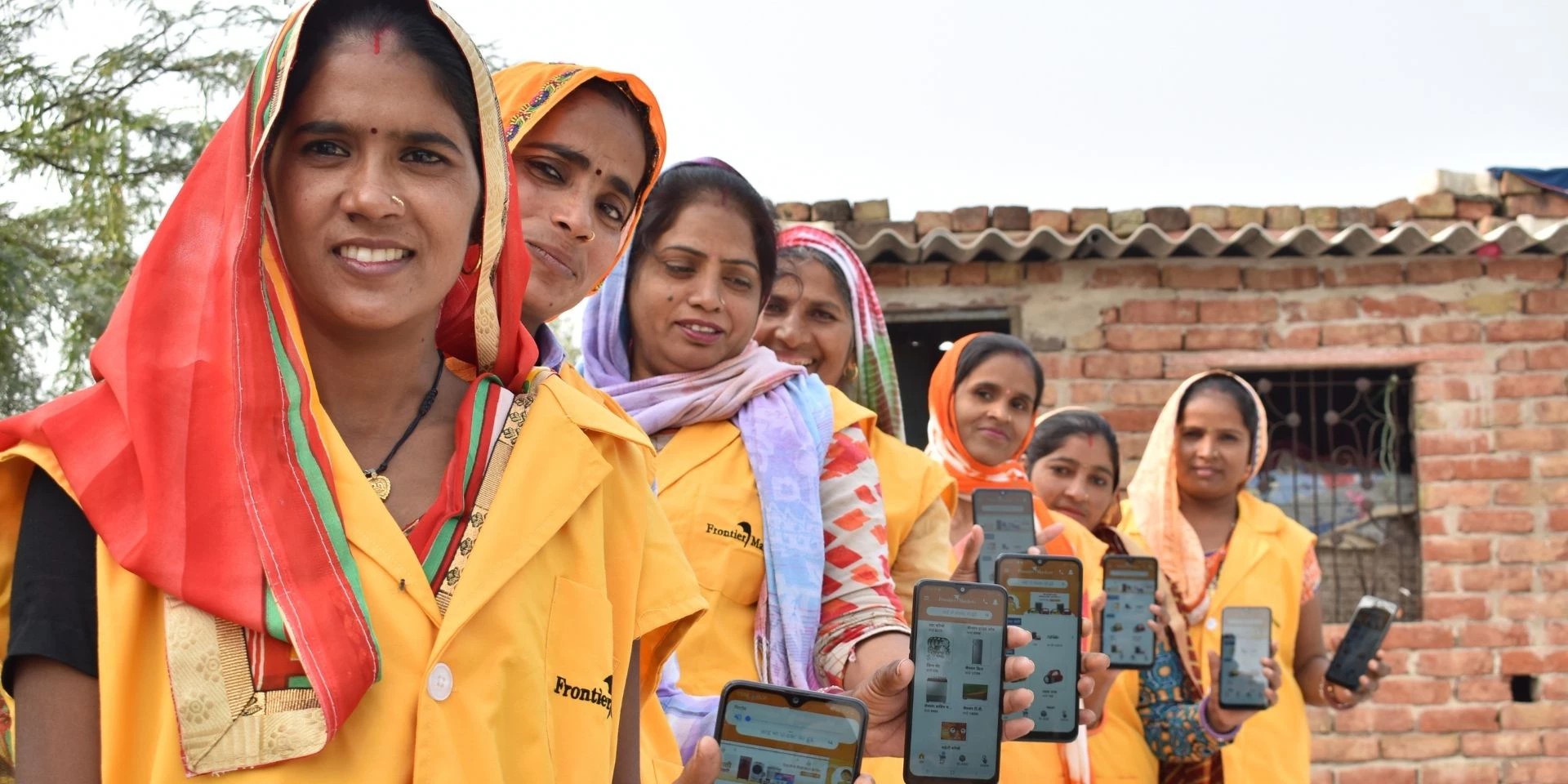“We had nothing—no rice, sugar, salt, or soap,” said Meena Devi. With no supply, the only general store in her village in Rajasthan, soon ran out of provisions. That was the last straw. Given the COVID-19 pandemic, she was already at her tether’s end like many others across rural India, the worst hit by the nationwide lockdown in late March. With disrupted supply chains, empty shelves, opportunistic price hikes, and restricted mobility, people living in remote villages were struggling more than ever.
This is when Frontier Markets, a last-mile distribution company, stepped up to help the distressed villagers in eastern Rajasthan, where almost half-a-million people live in around 2,500 villages. The company, which delivers reliable solar power solutions and consumer durables in these villages, markets its products through a network of women—Saral Jeevan Sahelis (friends who make life easier). Every village had a saheli with a smart phone to help place orders.
“Once the lockdown was announced, Frontier Markets—like everyone else—had to close down,” said Ajaita Shah, the company’s founder and Chief Executive Officer. “Working from home, we quickly converted ourselves into a big call center, using all our employees to call our sahelis and take stock of the situation on the ground.”
Responding promptly, Frontier Markets, in a first, added groceries, personal hygiene items, and agricultural tools to its products basket, roping in several fast-moving consumer goods (FMCG) and agri-goods companies. Secondly, the company worked with the Rajasthan government to tackle the supply gap and reach every last-mile customer, ensuring the delivery team had the necessary permits to travel. Thirdly, the company focused on its technology platform to cater to the growing demand for essential goods.
The three-pronged approach worked. In just two days, following a call from her territory manager, Meena Devi—also a saheli—received a load of products for her village. Meanwhile, the delivery team was having a tough time with the situation constantly evolving. Sometimes it included unforeseen circumstances or new restricted zones, and at other times, the team was stopped from entering the designated villages. On top of that, they had to stay safe to avoid contracting the virus.
Despite the obstacles, the delivery team was not ready to give up. In one instance, two of them covered several villages at one go—the bulging side racks on their motorbikes holding all that the villagers needed. With safety an absolute priority, the company tracked everything—right from the time when an order was placed, to how long it was on hold given stocks not reaching the warehouses, and when it was delivered.
Bright Spark
An alumna of Tufts University, Massachusetts, Shah spent many years in the microfinance industry in India, often visiting remote rural areas. That is how she noted huge gaps in the last-mile delivery of products and services. Little or no electric supply was a major problem, and Shah, well aware of the need to check emissions—even while helping villagers find lighting alternatives—founded Frontier Markets in 2011.
Shah’s goal was to exclusively supply clean energy products to village stores in the districts of Jaipur, Alwar, Ajmer, and Dholpur in Rajasthan. In line with its development vision, within a couple of years, Frontier Markets joined IFC’s Lighting Asia/India—a subsidiary of its Lighting Global program—which aims to accelerate access to clean energy by promoting quality and affordable solar solutions in rural India.
IFC helped Frontier Markets with several things—from improving its product range and pricing strategy to building partnerships with local NGOs and self-help groups. It also helped the company launch a consumer awareness campaign on quality solar products. Soon, with local feedback, Frontier Markets manufactured its own solar torch, the first in India to receive Lighting Global’s Quality Standard certification.
Most importantly, IFC helped the company change its marketing model. An Acumen Lean Data Study in 2015 revealed that though most of the company’s customers were male, 70 percent of its product users were women. It was just that they did not visit the shops physically. Following this, Frontier Markets stopped selling through shops and instead created an all-women sales force.
While the lockdown is over, the pandemic remains a concern, preventing the company’s agents from moving around freely to get fresh orders. In response, Frontier Markets increased the number of sahelis to four per village, across 2500 villages, scaling up to 10,000 sahelis. “We also onboarded 350,000 households on our digital platform, selling over 1.6 million solutions this year—10 times the products to twice the number of customers compared with last year,” said Shah. Among other things, the company also developed an assisted learning tool to guide newly-recruited sahelis.
While over the years, Frontier Markets has widened its range of solar appliances, the pandemic pushed the company to explore uncharted territory. Moreover, last July, the company partnered with a fintech company, Eko India Financial Services, to offer doorstep banking services. Moving forward, Shah is keen to offer wider banking services and also ensure the availability of refurbished smartphones in villages at a fraction of their original cost. “Our success is based on recognizing that rural households are not poor beneficiaries, but—with the right financial tools—empowered customers,” she summed up.
About Lighting Asia/India
Lighting Asia/India Program is implemented in partnership with Australia, Austria, Canada, Hungary, Iceland, Italy, Luxemburg, Netherlands and Norway.
Published in February 2021
